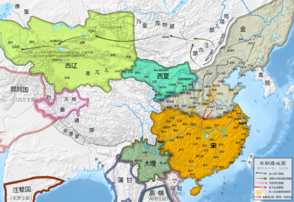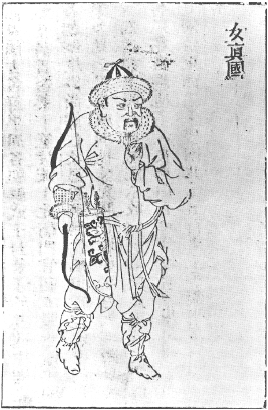Battle of Caishi facts for kids
Quick facts for kids Battle of Caishi |
|||||||
|---|---|---|---|---|---|---|---|
| Part of the Jin–Song Wars | |||||||
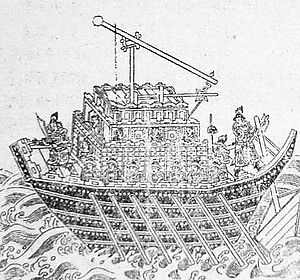 A Song dynasty river ship with a catapult, from the Wujing Zongyao |
|||||||
|
|||||||
| Belligerents | |||||||
| Jin dynasty | Southern Song dynasty | ||||||
| Commanders and leaders | |||||||
| Wanyan Liang † | Chen Kangbo (prime minister / navy) Yu Yunwen (army commander) |
||||||
| Strength | |||||||
| 40,000 | 18,000 | ||||||
The Battle of Caishi (Chinese: 采石之戰) was a huge naval battle in China's Jin–Song Wars. It happened on November 26–27, 1161. The Song dynasty won a big victory. They used new gunpowder weapons to help them win.
Soldiers led by Wanyan Liang, the emperor of the Jurchen-led Jin dynasty, tried to cross the Yangzi River. Their goal was to attack the Southern Song dynasty.
Chen Kangbo, the Song prime minister, was the main military planner and led the navy. Yu Yunwen, a government official, commanded the defending Song army. The Song fleet had special paddle-wheel warships. These ships had trebuchets that could launch incendiary bombs. These bombs were made of gunpowder and lime. The Song ships easily defeated the lighter Jin ships.
Contents
What Happened at Caishi?
Starting in 1125, the Jin dynasty had taken over lands north of the Huai River from the Song. In 1142, a peace treaty set the border. The Jin controlled northern China, and the Song controlled the south. In 1150, Wanyan Liang became emperor of the Jin. He wanted to unite all of China under his rule. In 1158, he said the Song had broken the 1142 treaty. This was his reason for starting a war against the Song. He began preparing for war the next year.
Wanyan Liang made all healthy men join the army. This was called a draft. Many people didn't like the draft, which led to small rebellions. These rebellions were stopped. The Jin army left their capital city of Kaifeng on October 15, 1161. They marched from the Huai River to the Yangzi River.
The Song army had strong defenses along the Yangzi River. Wanyan Liang planned to cross the river at Caishi. This place is near modern-day Ma'anshan. On November 26, he started to cross the Yangzi. His forces fought the Song army led by Yu Yunwen and Chen Kangbo. Wanyan Liang lost the battle and went back to Yangzhou.
Wanyan Liang was killed by his own soldiers soon after the battle. A new emperor, Emperor Shizong, had taken over the Jin court while Wanyan Liang was away. A peace treaty was signed in 1165, ending the fighting between Song and Jin.
At Caishi, the Song army had about 18,000 soldiers. Wanyan Liang's army was said to have 600,000 Jin soldiers. During the battle, many Jin soldiers ran away. They realized their northern cavalry (horse soldiers) were not good for river battles. The Song won because of their strong navy, gunpowder, and firearms. This victory made the Song soldiers feel much better. It also stopped the Jin army from moving further south.
Why Did the War Start?
China's Dynasties
The Song (960–1276) was a Chinese dynasty that ruled over Southeast China. To their north was the Jin dynasty. The Jin were led by the Jurchens, who were tribes from Manchuria. Many northern Chinese nobles were also part of the Jin. The Liao was another dynasty led by the Khitan people. They controlled parts of Mongolia and West China.
The Song and Jin were once allies. In 1114, the Jurchens, led by Wanyan Aguda, planned to rebel against the Khitan-led Liao dynasty. In 1115, Aguda started the Jin dynasty. The Jin and Song agreed to attack the Khitans together.
In 1122, the Jin captured some Khitan capitals. The Song tried to capture the Liao Southern Capital of Yan (modern Beijing), but the Jin took it first. The Song and Jin signed a treaty in 1123. But they soon had disagreements over land. In 1125, the Jin invaded the Song.
Beginning of the Jin-Song Wars
By 1127, the Jin had taken over most of northern China. They attacked the Song capital of Kaifeng twice. During the second attack, Emperor Qinzong of the Song was captured. The Jin took him and the Song royal family as prisoners. Song court members who escaped fled south. They set up a temporary capital in Hangzhou in 1129.
This move marked the change from the Northern Song to the Southern Song era. Qinzong's younger brother, Prince Zhao Gou, became the new emperor in 1127. He is known as Emperor Song Gaozong. In 1130, the Jin general Wuzhu crossed the Yangzi River to capture Gaozong, but the Emperor escaped. Wuzhu went back north across the Yangzi. There, he fought a stronger Song fleet.
The Jin kept trying to advance into Song lands south of the Yangzi. But they faced rebellions from Song loyalists in the north. Important Jin leaders also died. Song generals like Yue Fei also launched attacks. The Jin created a puppet government called Da Qi. This was meant to be a buffer state between Song and Jin. But Qi failed to defeat the Song. The Jin ended Da Qi in 1137. As the Jin stopped moving south, peace talks began again.
In 1142, the Treaty of Shaoxing was signed. It set the border between the two states along the Huai River. This river is north of the Yangzi. The treaty said the Song could not buy horses from the Jin. But people still smuggled horses across the border. Relations were mostly peaceful from 1142 until 1161, when Wanyan Liang started the war.
Jin Prepares for War
Wanyan Liang became Jin emperor in 1150. He killed his cousin, Emperor Xizong, to take power. Wanyan Liang saw himself more as a Chinese emperor than a Jurchen tribal leader. He wanted to rule all of China. As a child, Wanyan Liang learned Song customs. Once emperor, he tried to make the Jin state more like the Chinese (this is called sinicizing). He moved the Jin capital south to Beijing in 1157. He also moved government offices south. He tore down old Jurchen palaces and built new ones. Wanyan Liang's building projects cost a lot of money.
He started planning for war against the Southern Song in 1158. That year, Wanyan Liang said the Song had broken the 1142 treaty. He claimed they were buying horses, which was forbidden. In 1159, he began building up his army. He gathered weapons and horses. Wanyan Liang knew he needed many men to invade the Song. He made sure both Chinese and Jurchen soldiers were drafted. This draft lasted until 1161.
Naval battles were likely because the Jin planned to travel by river. Ships were taken for the war. About 30,000 new soldiers were assigned to the Jin fleet. Wanyan Liang ordered new ships to be built in March 1159. Construction began near Beijing. Wanyan Liang took personal command of the Jin forces. The draft was not popular. Several rebellions broke out against it. But Wanyan Liang did not allow anyone to disagree. He even had his stepmother killed for criticizing the war.
Wanyan Liang wanted to be the only ruler of a united China. So, he ordered all male members of the Song and Liao royal families in Jin land to be killed. About 130 royal family members were killed in a few months. This was very unpopular. The Khitans soon rebelled in Northeast China. They refused to join the army. They said the draft would leave their homeland unprotected. Wanyan Liang ignored their demands. The Khitan rebels then killed several Jurchen officials. Wanyan Liang had to send soldiers and resources away from the war to stop this rebellion.
Song Prepares for War
The Song and Jin still exchanged diplomats before the war. The History of Song says the Song realized the Jin were planning an invasion. They noticed a Jin diplomat being rude. Some Song officials saw the war coming. But Emperor Gaozong hoped to keep peace with the Jin. His wish for peace delayed strengthening the Song border defenses. The Song quickly built only three military bases in 1161. Wanyan Liang left Kaifeng on October 15, 1161. His attack had four armies. Wanyan Liang himself led the army that went into Anhui. The Jin crossed the Huai River border on October 28. They moved into Song territory. The Song resistance was small there. This was because they had fortified the southern shore of the Yangzi River, not the Huai.
Chen Kangbo ([undefined] Error: {{Lang}}: no text (help)), the prime minister of the Song dynasty, led the Song navy. He planned the strategy against the Jin. Yu Yunwen, a government official, commanded the defending Song army. The paddle-wheel warships of the Song fleet were very strong. They had trebuchets that launched incendiary bombs. These bombs were made of gunpowder and lime. These weapons helped them easily defeat the lighter Jin navy.
Wanyan Liang's army set up camp near Yangzhou on the north side of the Yangzi River. The Jin advance had been slowed by Song victories in the west. There, the Song captured several areas from the Jin. Wanyan Liang ordered his forces to cross the Yangzi at Caishi. This is south of modern Nanjing. A naval battle between Jin and Song happened on November 26 and 27, 1161.
Chen Kangbo ([undefined] Error: {{Lang}}: no text (help)), the prime minister and naval leader, planned the Song strategy. Chen led one naval group himself. He sent General Yu Yunwen (a government official) and other leaders to command the rest of the army. Yu was at Caishi by chance. He was there to give awards to brave Song soldiers. His visit happened to be at the same time as Wanyan Liang's attack. When Yu first arrived, Song forces at Caishi were scattered. Yu took command and brought them together.
On November 26, Jin troops started to cross the Yangzi. They fought the Song fleet. Some of the Jin ships were poorly built. The Jin had lost several ships earlier in Liangshan County. They got stuck in the shallow Liangshan Lake while being moved to the Grand Canal. Wanyan Liang had urgently asked for more ships to be built in 1161. One story says the Jin ships were built in a week. They used materials from destroyed buildings. The lack of good ships meant the Jin could not bring enough soldiers for a naval battle.
The Song military fought harder than Wanyan Liang expected. The Song navy's paddle-wheel ships were faster. They could move better than the slower Jin ships. The Song kept their fleet hidden behind Qibao Shan island. A scout on horseback would signal when Jin ships were coming. He would raise a flag on the island's peak. Once the flag was seen, the Song fleet attacked from both sides of the island. Song soldiers used traction trebuchets. These launched "thunderclap bombs" and other soft bombs. These bombs contained lime and sulfur. When they broke, they created a harmful explosion. Jin soldiers who managed to cross the river were attacked by Song troops waiting on the other side. The Song won a big victory. Wanyan Liang was defeated again the next day. After burning his remaining ships, he went back to Yangzhou. He was killed there before he could plan another crossing.
One [the middle squadron] was stationed in midstream. These carried our elite troops to meet the attack. The remaining two squadrons were hidden in creeks to serve as reserve. Barely was the arrangement completed when suddenly we could hear the shouts of the Tatar hordes. The Tatar chieftain, holding a small red flag, ordered several hundred of his boats to cross the river. In a short time, seven boats reached the south bank. The Tatars leaped ashore and fought with the government troops. Your minister walk[ed] back and forth in our ranks, again and again exhorted our men about their great duty and also promising them rewards. Our men fought desperately, and after all the enemy [ashore] had been killed or taken prisoner, the battle continued on the river. Our large warships then attacked and sank many of the Tatar boats. Enemy troops who were drowned or killed are estimated to be as many as ten thousand. As darkness came, the sound of drums gradually quieted, and the Tatars fled in their remaining boats.
– Yu Yunwen describing the battle at Caishi
Another story tells how General Chen Lugong (Chen Kangbo) also led naval groups to defeat the Jin and protect the Song.
How Many Were Lost?
The number of soldiers and deaths in the battle varies. A Song source says there were 18,000 Song soldiers at Caishi. One document claims 400,000 to 600,000 Jin soldiers were there. Herbert Franke, a historian, believes the Song had only 120,000 soldiers on the whole front. He thinks the half-million figure for Jin might have been the number before they crossed the Huai River. Many Jin soldiers ran away or died fighting rebellions as they moved south. This would have made their army smaller by the time they reached the Yangzi.
The History of Jin, written from the Jin side, reports Jin deaths between 1,000 and 2,200 men. The History of Song reports 4,000 Jin soldiers died. It also says two Jin commanders of 10,000 men were killed. Another Song source says 24,000 Jin soldiers died. It also claims 500 fighters and five Jin commanders were captured. A more careful Song source estimates the Jin had only 500 soldiers and 20 ships at Caishi.
Military Technology
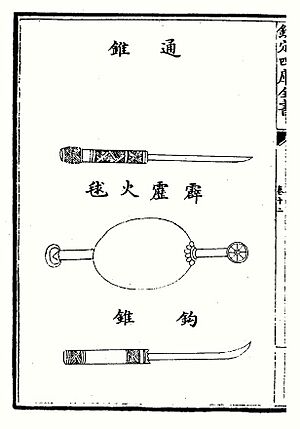
A description of the Song's technology comes from a poem called Hai Qiu Fu ("Rhapsodic Ode on the Sea Eel Paddle Wheel Warships") by Yang Wanli:
The men inside them paddled fast on the treadmills, and the ships glided forwards as though they were flying, yet no one was visible on board. The enemy thought that they were made of paper. Then all of a sudden a thunderclap bomb was let off. It was made with paper (carton) and filled with lime and sulphur. (Launched from trebuchets) these thunderclap bombs came dropping down from the air, and upon meeting the water exploded with a noise like thunder, the sulphur bursting into flames. The carton case rebounded and broke, scattering the lime to form a smoky fog, which blinded the eyes of men and horses so that they could see nothing. Our ships then went forward to attack theirs, and their men and horses were all drowned, so that they were utterly defeated.
– Yang Wanli
The Song fleet had up to 340 ships during the battle of Caishi in 1161. The Song fleet used trebuchets. These were like giant slingshots. They launched incendiary bombs called pili huoqiu (霹雳火球 or huopao 霹雳火砲; "thunderclap fire balls"). These bombs had a mix of gunpowder, lime, iron scraps, and a poison (probably arsenic). The bombs made a loud sound, meaning the gunpowder had enough nitrate to explode. The powdered lime in the bombs created a blinding smoke cloud, like tear gas. The huoqiu released the smoke when the bomb casing broke. Fuses lit the bombs after they were launched.
The Jin forced thousands of blacksmiths to build armor and weapons for their fleet. Workers also dug a canal to move ships. The Jin covered their light ships with thick rhinoceros hides. The ships had two levels. On the lower deck were the oarsmen who rowed the ship. Soldiers on the upper deck could fire weapons. Several ships got stuck earlier. The new ships built to replace them were not as good. The Jin fleet could not beat the larger and faster Song warships.
This battle was very important for the Song navy's technology. The Song navy's new technology helped them control the East China Sea. There, they fought against the Jin and Mongol forces. "Thunderclap bombs" launched by ship-mounted trebuchets were invented earlier. But these bombs became required on Song warships in 1129. Paddle-wheel ships, powered by treadmills, were built in different sizes between 1132 and 1183. The engineer Gao Xuan designed a ship with up to eleven paddle wheels on each side. Qin Shifu, another engineer, designed iron plating for armoring ships in 1203. All these improvements helped the navy grow fast. According to Joseph Needham, the Song navy grew from 11 squadrons and 3,000 men to 20 squadrons and 52,000 men in one century.
What Happened After the Battle?
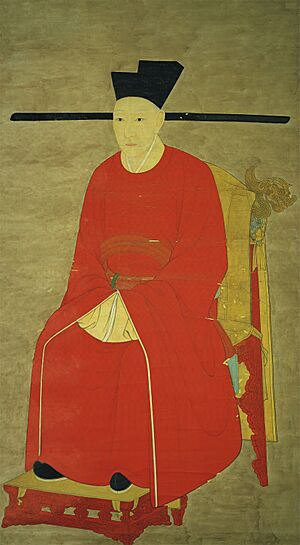
Chinese history books often praise the Battle of Caishi. It was seen as a very important Song victory. It was compared to the Battle of Fei River in 383. In that battle, the Eastern Jin defeated northern invaders. Caishi is shown as a victory against huge odds. Only 18,000 Song soldiers beat an army of almost half a million men. During the battle, more and more Jin troops ran away. They saw the Song navy was much better. This made the Jin army even smaller.
The Song had many advantages. They had bigger ships and plenty of time to get ready. The Jin army struggled to gather supplies and ships. Also, the Jin could not use their cavalry (horse soldiers) in a naval battle. Cavalry was the most important part of the Jurchen army.
The battle was not the only reason Wanyan Liang's military plan failed. His own mistakes also led to his downfall. Wanyan Liang's generals hated him. His relationship with his men got worse as the Jin lost battles. Many people in the empire disliked his rule. Wanyan Liang's policies had upset Jurchens, Khitans, and Chinese people. Upset officers planned to kill him. He was assassinated on December 15, 1161. Emperor Shizong became the new ruler of the Jin. He had taken the throne weeks before the assassination. This happened in a military takeover while Wanyan Liang was away. Shizong later changed many of Wanyan Liang's policies.
The victory made the Song soldiers feel much better. It increased trust in the government and made the Song more stable. The Jin gave up their goal of moving south and uniting China under their rule. The Jin army left in 1162. Diplomatic talks between the two states started again.
Song Gaozong retired nine months after the battle. The reasons for his retirement are complex. But Gaozong's handling of the war with Wanyan Liang might have played a part. He had ignored warnings of a Jin attack. His hope for peace delayed plans to strengthen the Song defenses.
Military fights continued in other areas. But Jin attacks after Caishi no longer aimed to reach the Yangzi. The Jin had learned that southern China's many lakes and rivers made it hard for their cavalry. After losing the battle, they signed a peace treaty with the Song in 1165. This ended the fighting. The Huai River border stayed the same.
|
See Also
- Battle of Tangdao
- Gunpowder warfare
- History of China
- Jiao Yu
- Military history of China (pre-1911)
- Naval history of China
- Naval warfare
 | Calvin Brent |
 | Walter T. Bailey |
 | Martha Cassell Thompson |
 | Alberta Jeannette Cassell |


